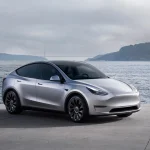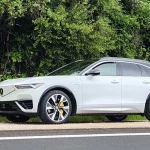
From The Fastest To The Greenest: BMW F1 Expertise For EVsFrom The Fastest To The Greenest: BMW F1 Expertise For EVs
“Racing improves the breed”. So said the late Soichiro Honda, believing that the lessons learned on the racing cars and motorcycles could be used to improve the marque’s road vehicles.
The evidence is plain to see. Technologies such as anti-lock brakes, traction control, unibody chassis, electrically adjustable shocks and many others have all stemmed from motorsport and have undoubtably helped to improve performance and safety in road vehicles.
BMW Experts take on the electric challenge
BMW have taken the theory one step further though: Following their exit from Formula One racing last year, their whole engineering team expertise has been moved over to the maker’s electric car program, to improve the electric breed.
50 ex-F1 engineers have migrated to BMWs EV program to ensure the German company retains their reputation for quality and performance even without fossil fuels.
Development chief Klaus Draeger says “The drivetrain is and will remain the heart of an automobile, and this goes for electric vehicles too… That’s why we’re developing the propulsion system for the Megacity Vehicle ourselves.” Engineer Jochen Schroeder adds “The technology we’re developing for BMW is pretty similar to Formula One”.
Both engineers clearly see their F1 experience as beneficial for the EV projects. Gone is the adrenaline of the high-octane race environment, replaced by considered strategic development and testing.
Gordon Murray Design T25 MinicarHigh octane to high voltage
The BMW engineers certainly aren’t the first to make the move from motorsports to EVs.
One notable engineer to have made the move from the red-hot to the green is South-African born Gordon Murray. Murray is best known for his work on Brabham and McLaren Formula One cars throughout the seventies, eighties and nineties, and his role in designing the McLaren F1 road car and the Mercedes-Benz SLR McLaren, both 200mph plus supercars known rather more for performance than economy.
Murray has moved from one extreme to the other though.
The engineer has now turned his talents to the T25 and T27 microcars. The former is gasoline powered, but the T27 will have an electric motor providing the power. Smaller than a Smart ForTwo, the T25 and T27 aren’t just green vehicles but their “i-Stream” production is low energy too, as much as 80 percent less than regular car production.
The motorsport pedigree can be seen in the lightweight chassis, central driving position and economy of materials use, effectively getting the most from the least.
Porsche 911 GT3 R Hybrid Porsche, hybrids and KERS
German sports car company Porsche wants to get in on the act too. In a good example of racing improving the breed, the company are using their 911 GT3-R Hybrid race car to develop techology that will eventually be seen in their road cars.
Using a regular gasoline powertrain coupled with electric motors powering the front wheels for extra traction and a kinetic energy recovery system (similar to that used by BMW’s old F1 team) to recharge the hybrid’s batteries. The car has been making quite an impact and raising the profile of electric technology in events such as the Petit Le Mans and the Nürburgring 24 Hours.
EV advocates
If engineers and manufacturers aren’t enough, we’ve seen motor racing personalities themselves “go electric”.
Sir Stirling Moss, Grand Prix driver from 1951 to 1961 and winner of 16 races, is now a die-hard EV advocate, in particular showing his support for the Mitsubishi i-MiEV. Indeed, you can take a drive with the racing legend on his YouTube channel:
If you’re a fan of the TV series Top Gear (not known for their support of EVs) you’ll also be familiar with The Stig, their (ex) tame racing driver who recently caused a stir by revealing his identity.
Ben Collins, the man inside the suit, has been featured frequently in British tabloid The Sun, recently tested the 2011 Nissan Leaf, coming away impressed. You can read more about his review in our story from earlier this week.
The future?
So can we expect more expertise and support coming to the world of EVs? You bet. As the technology develops and improves it becomes a greater priority for automakers and emphasis will increase on getting the best knowlege on EV projects.
Invariably, this will mean turning to experts from other motoring fields, and some of the top automotive minds are in motorsport, where tight rules and intense competition force innovation to a level far ahead of road cars.
So Soichiro-san was right on the money. Racing improves the breed, but not always in the way you’d expect.
[Bloomberg]
View original artcle at: “https://www.greencarreports.com//news/1050265_from-the-fastest-to-the-greenest-bmw-f1-expertise-for-evs”
Add a comment Cancel reply
Comments (0)
this article
… [Trackback]
[…] Information on that Topic: autoseu.com/from-the-fastest-to-the-greenest-bmw-f1-expertise-for-evsfrom-the-fastest-to-the-greenest-bmw-f1-expertise-for-evs/ […]
AE Sexy Gaming
… [Trackback]
[…] Find More here on that Topic: autoseu.com/from-the-fastest-to-the-greenest-bmw-f1-expertise-for-evsfrom-the-fastest-to-the-greenest-bmw-f1-expertise-for-evs/ […]
Categories
- Activism (1)
- Adventure (1)
- Advertising (2)
- Agriculture (1)
- Air pollution (4)
- Air transport (3)
- aluminium (2)
- Amazon (3)
- Animals (1)
- Apple (2)
- Architecture (1)
- Arctic (1)
- Artificial intelligence (1)
- Augmented Reality (1)
- Auto Detailing (1)
- autopilot (1)
- battery (31)
- Best summer holiday destinations 2022 (1)
- Bicycle (1)
- biodiversity (1)
- BMW (2)
- boat (1)
- Bus (1)
- Business (4)
- Buying Guides (1)
- car (7)
- Car industry (18)
- Car News (18)
- car rental (3)
- Car Reviews (4)
- Car sales (6)
- carbon emissions (15)
- carbon footprint (3)
- Carlos Ghosn (1)
- Cars (66)
- Central Europe (1)
- CES (2)
- charging station (11)
- Children (1)
- China (12)
- Citroën (1)
- city (1)
- City transport network (2)
- clean energy (2)
- Climate (1)
- climate change (9)
- Climate crisis (4)
- Climate emergency (2)
- climate protection (2)
- CO2 emissions (39)
- Company (3)
- Competition (1)
- Conscious travel (2)
- Contamination of water (1)
- Copper (2)
- cost of living (2)
- Cuba (1)
- Cuban politics (1)
- Cybertruck (1)
- Cycling (1)
- deforestation (1)
- delivery (3)
- Denmark (2)
- Detroit (1)
- Diesel (4)
- Diesel car (7)
- e-mobility (11)
- e-scooter (2)
- Eco travel (3)
- Eco-friendly (2)
- Ecology (1)
- Economy (1)
- El Niño (1)
- Electric (11,302)
- Electric boats (1)
- electric car (107)
- Electric Cars (499)
- Electricity (5)
- Electricity consumption (3)
- Electricity market (5)
- Elon Musk (21)
- emission (1)
- Emmanuel Macron (1)
- Energy (2)
- Energy low cost (1)
- energy transition (6)
- Entrepreneur (1)
- Environment (5)
- Environment pollution (1)
- Environmental protection (4)
- EU Policy (1)
- EU-China (2)
- Europe (7)
- Europe's energy crisis (1)
- European Commission (3)
- European economy (2)
- European Union (18)
- Euroviews (6)
- Eviction (1)
- EVs (37)
- F1 (1)
- factory (4)
- fake news (1)
- family (2)
- Ferrari (1)
- fertilizer (1)
- fine (penalty) (1)
- fire station service (1)
- flight (1)
- Flying car (4)
- Food security (1)
- Ford (1)
- Formula 1 (2)
- Fossil fuels (14)
- France (39)
- free trade (1)
- Fuel (3)
- Fuel cell electric vehicles FCEV (10)
- fuel crisis (2)
- Fuel Efficiency (3)
- fuel prices (1)
- Funeral (1)
- Gas (1)
- Gas Prices (1)
- gasoline price hike (1)
- German (1)
- Germany (8)
- Giorgia Meloni (1)
- Global warming and climate change (1)
- Good News (1)
- Greece (1)
- green energy (1)
- green new deal (1)
- Green transportation (17)
- Green Week (1)
- greenhouse gas emissions (6)
- Hanoi (19)
- Health (1)
- home (2)
- homelessness (1)
- Housing market (19)
- human rights abuse (1)
- Hybrid (2,283)
- Hybrids (116)
- Hydrogen (2)
- hydrogen vehicle (2)
- IAA Mobility (2)
- Iceland (3)
- incident (1)
- income (1)
- India (2)
- Indonesia (1)
- infrastructure (1)
- innovation (1)
- International relations (1)
- Investment (4)
- iPhone (1)
- Japan (1)
- Jobs (3)
- Joe Biden (4)
- Jubilee (1)
- Lampedusa (1)
- Las Vegas (1)
- lead petrol (2)
- Lithium (13)
- liveable cities (2)
- London (3)
- Luxembourg (1)
- Luxury (2)
- luxury goods (2)
- Luxury lifestyle (2)
- Manufacturing (5)
- Market (1)
- Markets (1)
- meat (1)
- Mercedes-Benz (39)
- Migrants (1)
- minerals (2)
- Mining (5)
- Mitsubishi Motors (1)
- Mobile World Congress (1)
- Mobility (10)
- Mobility Week (2)
- Mobility Week 2021 (1)
- Mobility Week 2023 (5)
- money (3)
- Motorcycling (2)
- Motorsport (1)
- Mountain (1)
- NASA (1)
- nature (2)
- net-zero (2)
- New technologies (6)
- Next Explainers (1)
- Next In data (2)
- Nigeria (1)
- Nissan (3)
- Norway (7)
- Nuclear Energy (1)
- nuclear fusion (1)
- Nuclear power plant (1)
- Odd (1)
- oil industry (1)
- Olaf Scholz (1)
- online shopping (1)
- Oslo (1)
- Paris (1)
- parody (1)
- Petroleum products (3)
- Peugeot (1)
- plastic (1)
- Poland (1)
- Politics (1)
- Pollution (44)
- Power Plant (1)
- prices (1)
- production (1)
- Profits (1)
- Prostitution (1)
- Public transport (4)
- Racing cars (1)
- Racism (1)
- Rail transport (2)
- rats (1)
- Raw material (1)
- Recycling (4)
- Renault (3)
- Renewable energies (6)
- renewable energy (6)
- Reykjavík (1)
- Rishi Sunak (1)
- road (36)
- Road infrastructures (1)
- Road safety (7)
- Road transport (20)
- road trip (1)
- Robot (1)
- Rolls Royce (1)
- Russia (1)
- Russia's invasion of Ukraine (2)
- Sadiq Khan (1)
- safari (1)
- Safety (1)
- Sale (1)
- sales (3)
- Scotland (1)
- self-driving (43)
- Semiconductor (1)
- Shares (1)
- Show (1)
- Silicone (1)
- Software (1)
- Solar energy (2)
- solar power (5)
- Space technology (1)
- Spain (1)
- start-up (3)
- Stock exchange transaction (1)
- Stock market activity (1)
- Stockholm (1)
- Strasbourg (1)
- Students (1)
- Summer Olympics (2)
- Sustainability (7)
- Sustainable city (3)
- Sustainable design (3)
- Sustainable development (1)
- Sustainable innovation (9)
- Sustainable technology (21)
- Sustainable tourism (4)
- Sweden (2)
- Tata Motors (2)
- Tax (37)
- Taxes (2)
- Taxi (1)
- Technology (55)
- Tesla (73)
- The Boring company (1)
- Tokyo Olympic Games 2020 (1)
- Toyota (4)
- trade (3)
- traffic (1)
- Trains (2)
- Transport (11)
- transportation (3)
- Travel destinations (1)
- Tunnel (1)
- Twitter (3)
- UBER (1)
- Ukraine war (1)
- Uncategorized (6)
- United Kingdom (5)
- United States (6)
- urban planning (2)
- Ursula von der Leyen (3)
- US politics (1)
- USA (1)
- vegan (1)
- vehicle (7)
- Video (4)
- Vietnam (19)
- Volkswagen (3)
- Volvo (2)
- waste (1)
- waste disposal (1)
- Water (1)
- Water resources (1)
- White House (1)
- wind energy (1)
- Wind turbine (1)
- Winter (2)
- work conditions (1)
- World Travel Market (1)
- Xiaomi (1)
Recent Posts
About us

Popular Tags
Related posts


Volvo EX30 in the test: Really a premium car at a volume price?

VW ID.7: Estate is not called Variant... It's a Tourer







